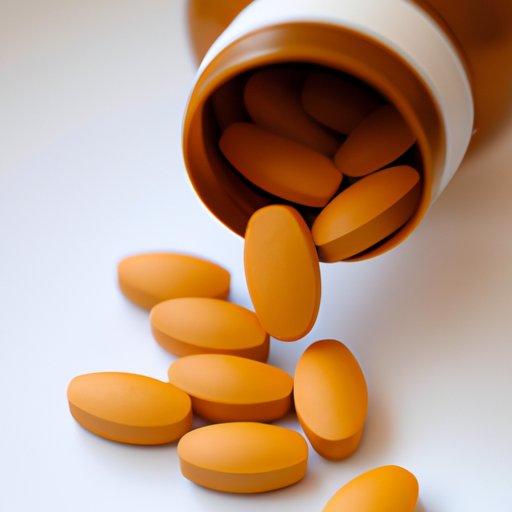
Introduction
Vitamin D is an essential nutrient that plays a crucial role in maintaining our overall health. Despite its importance, studies have shown that around 1 billion people worldwide suffer from Vitamin D deficiency. Vitamin D deficiency is associated with a range of health problems, from weak bones to a weakened immune system. Given its importance for our health, it is crucial to ensure that we are getting enough Vitamin D daily.
This article is designed to provide you with the essential information you need to choose the right Vitamin D supplement, understand the differences between Vitamin D2 and Vitamin D3, learn about top foods rich in Vitamin D, and how much Vitamin D you need daily to maintain your bone, immune, and mental health.
The Ultimate Guide to Choosing the Right Vitamin D Supplement
There are various types of Vitamin D supplements available on the market, including Vitamin D2 and Vitamin D3. It can be challenging to choose the right supplement with such a plethora of options. Here are the factors to consider when choosing the right Vitamin D supplement for you:
Dosage: The amount of Vitamin D in each supplement varies significantly. Depending on your needs, you may need a higher or lower dosage. Your doctor, dietician, or nutritionist can tell you how much Vitamin D you need daily through diet or supplements.
Form: Vitamin D supplements are available in various forms such as capsules, softgels, tablets, or liquid. Some people may prefer liquid form because they have difficulty swallowing pills, while others may prefer capsule or softgels because they are easier to take and are tasteless.
Source: There are two sources of Vitamin D supplements on the market: synthetic and natural. Synthetic supplements are made in the laboratory, while natural supplements are extracted from animals such as fish or sheep. Some prefer natural supplements because they believe they are more beneficial, while others prefer synthetic options because they are vegan.
When it comes to Vitamin D supplements, you want to choose an effective and safe option that meets your specific needs. Some suggested options include:
Pure Encapsulations Vitamin D3 Liquid: This supplement contains Vitamin D3 in liquid form, which makes it easy to take for those who have difficulty swallowing pills.
NatureMade Vitamin D3 Softgels: These softgels are an excellent choice for those who want a high dosage of Vitamin D.
NOW Vitamin D3 Capsules: This option is an excellent choice for vegans or those who prefer synthetic supplements. It is easy to digest and is available in capsule form.
Vitamin D2 vs. Vitamin D3: Which One is Better?
There are two types of Vitamin D commonly found in supplements: D2 and D3. But which one is better? Here is a comparison between these two types:
Vitamin D2: Vitamin D2, also known as ergocalciferol, is made from irradiating fungus and plant sources with ultraviolet light. It is less potent than D3 and is typically used in prescription supplements.
Vitamin D3: Vitamin D3, also known as cholecalciferol, is made from irradiating animal sources such as fish, sheep, or pig skin with ultraviolet light. It is more potent than D2 and is the version of Vitamin D produced naturally by humans when exposed to sunlight.
While both Vitamin D2 and D3 can raise blood levels of Vitamin D, Vitamin D3 is considered the superior option. According to research Vitamin D3 is more bioavailable, which means it is better absorbed by the body, so it can quickly and effectively raise our Vitamin D levels.
Top 5 Foods Rich in Vitamin D You Should Include in Your Diet
Food is an excellent source of Vitamin D. Here are the top foods you should include in your diet to ensure you are getting enough Vitamin D daily:
Fatty fish: Fatty fish such as salmon, mackerel, and tuna are some of the best food sources of Vitamin D. A three-ounce serving of cooked salmon has around 447 IUs (International Units) of Vitamin D.
Mushrooms: Mushrooms are packed with Vitamin D2, which is rare in most foods. A cup of portobello mushrooms contains around 400 IUs of Vitamin D.
Fortified dairy products: Many dairy products like milk, yogurt, and cheese are fortified with Vitamin D. One cup of fortified milk contains around 115-130 IUs of Vitamin D.
Egg yolks: Egg yolks are a good source of Vitamin D3. Eating one egg yolk provides around 40 IUs of Vitamin D.
Cod liver oil: Cod liver oil is a great source of Vitamin D. One teaspoon of cod liver oil contains around 448 IUs of Vitamin D.
To ensure you’re getting enough Vitamin D through your diet, you need to consider your age, location, skin type, and other factors. In general, the recommended daily intake of Vitamin D for adults is 600-800 IUs, although some people may require more.
The Importance of Vitamin D for Bone Health
Vitamin D is vital for maintaining healthy bones, as it helps the body absorb Calcium and Phosphorus from the food we eat. If our body lacks Vitamin D, it will take Calcium and Phosphorus from our bones, which can lead to bone weakness and fractures.
Studies have shown that people who take Vitamin D supplements have less risk of bone fractures, especially in older adults. If you are at risk of getting osteoporosis, you should talk to your doctor about how much Vitamin D you need daily to maintain healthy bones.
How to Get Enough Vitamin D if You Live in a Cloudy Region
Getting enough Vitamin D from the sun can be challenging, especially if you live in areas with limited sun exposure. Here are some ways to make sure you get enough Vitamin D:
Spend time in the sun: Try to spend at least 15-20 minutes in the sun each day. During this time, make sure your skin is exposed to the sun’s rays.
Take supplements: If you cannot get enough Vitamin D from your diet or sun exposure, you may need to take supplements. Your doctor can advise you on the right dosage of supplements based on your location, skin type, and lifestyle.
Eat Vitamin D-rich foods: Incorporate foods like fatty fish, mushrooms, and fortified dairy products into your diet.
In general, the amount of sun exposure you need to get enough Vitamin D depends on your location, lifestyle, and skin type. If you are unsure about how much Vitamin D you need, talk to your doctor.
The Link Between Vitamin D and Immune System Health
Vitamin D plays a crucial role in keeping your immune system functioning correctly. It helps regulate the immune system’s response by reducing inflammation and promoting the production of immune cells. If your body does not have enough Vitamin D, you may be at a higher risk of getting infections and diseases.
Studies have shown that people who have enough Vitamin D have a reduced risk of respiratory infections, autoimmune diseases, and cancers. If you’re looking to boost your immune system, talk to your doctor about how much Vitamin D you need daily.

Vitamin D and Mental Health: What You Need to Know
Vitamin D is vital for good mental health. Studies have shown that people with low Vitamin D levels are more likely to suffer from depression and other mental health issues. Additionally, Vitamin D is essential for cognitive function and may even help prevent dementia.
If you are looking to improve your mental health, talk to your doctor about incorporating a healthy dose of Vitamin D into your daily routine.
Conclusion
Vitamin D is an essential nutrient that is crucial for maintaining our overall health. Whether you get it through supplements or diet, ensuring that you are getting enough Vitamin D daily is essential. In this article, we have discussed the different types of Vitamin D supplements, the benefits and drawbacks of Vitamin D2 and D3, top foods rich in Vitamin D, the importance of Vitamin D for bone health, immune function and mental health, and how to get enough Vitamin D if you live in a cloudy region.
Don’t neglect your health; make sure you’re getting enough Vitamin D. Consult your doctor or nutritionist to learn more about incorporating Vitamin D into your daily routine.




